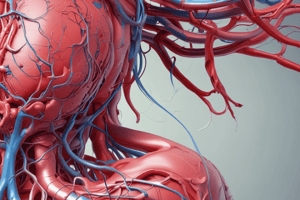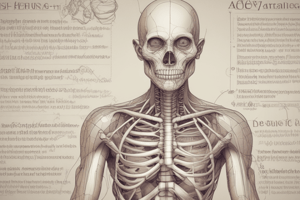Podcast
Questions and Answers
What term describes a structure that is located towards the back of the body?
What term describes a structure that is located towards the back of the body?
- Lateral
- Medial
- Anterior
- Posterior (correct)
Which term indicates a structure that is situated closer to the midline of the body?
Which term indicates a structure that is situated closer to the midline of the body?
- Inferior
- Lateral
- Medial (correct)
- Superior
What term is used to describe a structure that is located nearer to the feet?
What term is used to describe a structure that is located nearer to the feet?
- Superior
- Inferior (correct)
- Proximal
- Distal
Which of the following terms describes a structure that is positioned at the front of the body?
Which of the following terms describes a structure that is positioned at the front of the body?
What does the term 'lateral' signify in terms of body structure positioning?
What does the term 'lateral' signify in terms of body structure positioning?
Which statement accurately describes the relationship between the shoulder and the sternum?
Which statement accurately describes the relationship between the shoulder and the sternum?
What is the relationship between the head and the feet?
What is the relationship between the head and the feet?
Which description accurately identifies the positioning of the chest in relation to the back?
Which description accurately identifies the positioning of the chest in relation to the back?
How is the abdomen positioned in relation to the back?
How is the abdomen positioned in relation to the back?
What is the role of healthy stress in Hatha Yoga practice regarding bone health?
What is the role of healthy stress in Hatha Yoga practice regarding bone health?
Which statement correctly describes the relation of the lumbar region?
Which statement correctly describes the relation of the lumbar region?
How do bones respond to the healthy stresses applied during regular Hatha Yoga practice?
How do bones respond to the healthy stresses applied during regular Hatha Yoga practice?
Why are bones considered a critical reservoir for calcium in the body?
Why are bones considered a critical reservoir for calcium in the body?
What happens to bones when they do not experience healthy stress?
What happens to bones when they do not experience healthy stress?
What is the balance concept described in relation to Hatha Yoga and bone health?
What is the balance concept described in relation to Hatha Yoga and bone health?
Flashcards are hidden until you start studying
Study Notes
Anatomical Terminology of Position
- Medial: Refers to a structure closer to the midline of the body. Example: The sternum is medial to the shoulder.
- Lateral: Indicates a structure farther from the midline. Example: The shoulder is lateral to the sternum.
Proximity and Distance
- Proximal: Describes a position closer to a point of reference, such as the trunk of the body. Example: The shoulder is proximal in relation to the hand.
- Distal: Indicates a position farther from a point of reference. Example: The hand is distal to the shoulder.
Vertical Positioning
- Superior: Refers to a structure located above another. Example: The head is superior to the feet.
- Inferior: Indicates a structure located below another. Example: The feet are inferior to the head.
Anterior and Posterior Orientation
- Anterior: Describes a structure toward the front of the body. Example: The chest is anterior to the back.
- Posterior: Refers to a structure toward the back of the body. Example: The back is posterior to the chest.
Vential and Dorsal Positioning
- Ventral: Pertains to the front side of the body (synonymous with anterior in human anatomy). Example: The abdomen is ventral.
- Dorsal: Relates to the back side of the body (synonymous with posterior). Example: The lumbar region is dorsal.
Anatomical Positioning Terms
- The sternum is positioned towards the midline of the body, making it medial compared to the shoulder.
- The shoulder is located away from the midline of the body, indicating its lateral position relative to the sternum.
- Proximal refers to a part of the body that is closer to the point of attachment, making the shoulder more proximal than the hand.
- The hand is described as distal, meaning it is farther from the point of attachment when compared to the shoulder.
Directional Relationships
- The head is located above the feet, establishing a superior relationship between the two.
- Conversely, the feet are positioned below the head, making them inferior.
- The chest is located at the front of the body, which is referred to as anterior when compared to the back.
- The back is located at the rear of the body, making it posterior relative to the chest.
Regional Terms
- The abdomen is associated with the ventral aspect of the body, meaning it is situated towards the front.
- The lumbar region, part of the lower back, is identified as dorsal, indicating its position towards the back of the body.
Hatha Yoga and Bone Health
- Definition: Hatha Yoga emphasizes physical postures and breath control, aiming to enhance bodily awareness and promote health.
- Benefits of Practice: Regular engagement in Hatha Yoga applies stress on bones from different angles, which is essential for strengthening them through natural remodeling processes.
- Bone Remodeling Process: Bones adapt to applied stress by increasing calcium deposition, leading to enhanced bone density and overall strength.
- Healthy vs. Unhealthy Stress:
- Healthy stress from yoga poses promotes bone health.
- Absence of stress can weaken bones, increasing susceptibility to fractures.
- Calcium Reservoir:
- Bones are the main storage for calcium, crucial for various bodily functions including:
- Muscle contraction
- Nerve function
- Blood clotting
- Hormonal secretion
- Bones are the main storage for calcium, crucial for various bodily functions including:
- Physiological Balance:
- A balance of healthy stress and rest is vital, resembling the yin/yang concept, to maintain bone integrity and overall bodily health.
- Conclusion: Consistent practice of Hatha Yoga supports bone health by introducing healthy stress that is crucial for calcium management and developing bone strength.
Studying That Suits You
Use AI to generate personalized quizzes and flashcards to suit your learning preferences.





